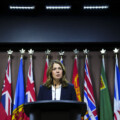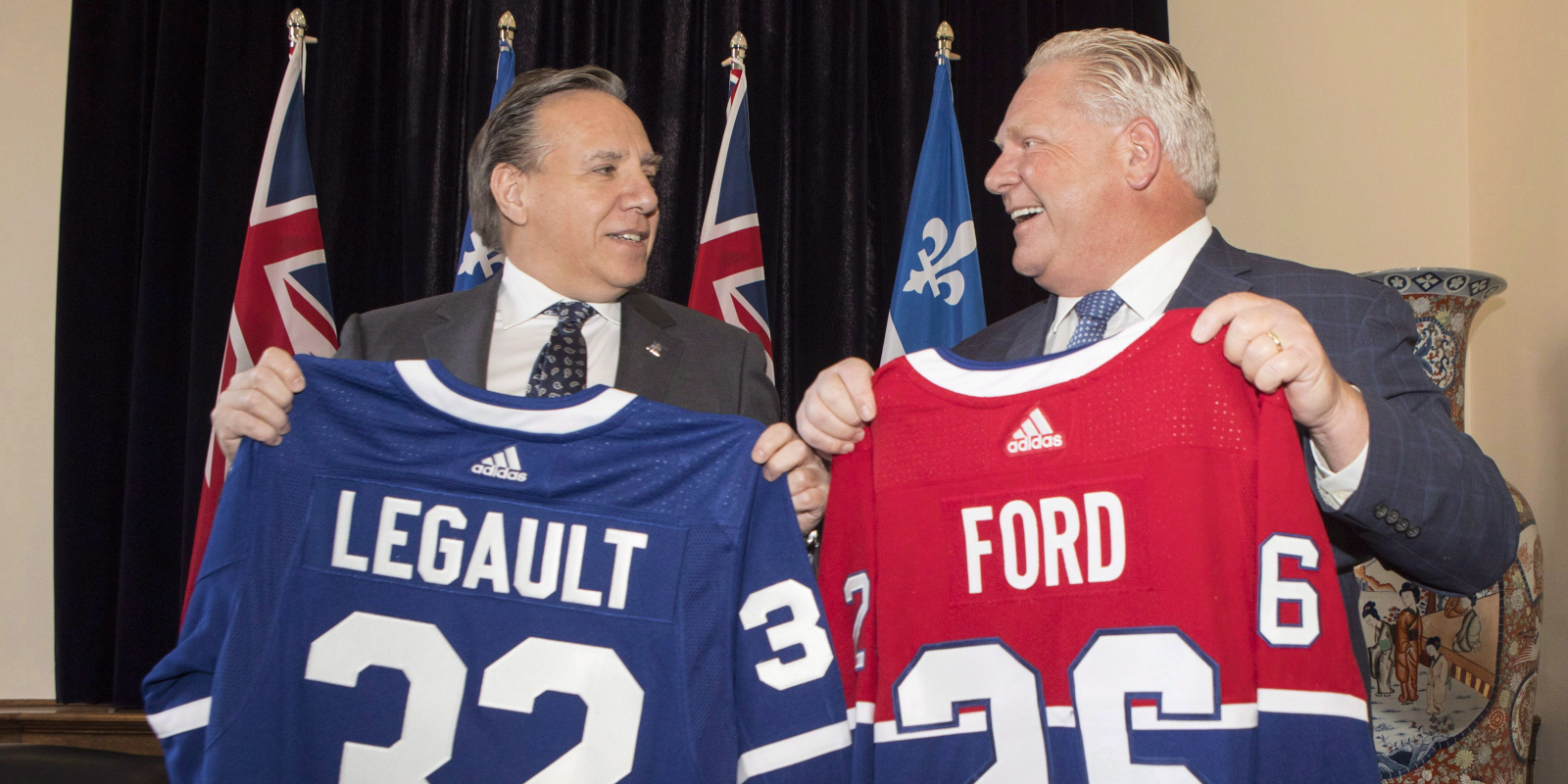Amid the doldrums of winter and COVID, commercials reminded Albertans how easy it was to use PlayAlberta, the province’s official gambling platform. In one ad, a man lugged a roulette wheel to the bus stop with him. Don’t worry, the ad said, now there’s a more convenient way to fritter your money away.
“If you don’t have anything else going on, you might as well gamble” was not the most inspiring message to receive from the government, but it was certainly a mission statement.
Now, over a year after the federal ban on single-game sports betting was lifted, every province except Saskatchewan has added sportsbooks to their digital casinos (melonheads can start betting online in November). If you think you can make a killing predicting the results of second division Slovakian soccer, governments hope you’ll try.
The NHL and NFL, of course, are where the real money is. While government sportsbooks may not be as popular as DraftKings, Bet99, and other private options that advertise on TSN and Sportsnet with the relentless zeal of revivalist preachers, provinces still see dollar signs. But what does it say about our governments that they’re hoping to profit from the losses of their citizens? And will gambling even be an effective revenue stream?
Concordia University economist Moshe Lander has no doubts about the latter. “There is zero chance that governments are doing this as a money-losing endeavour,” Lander says. “They don’t do a 180 on the morality of gambling with the intent of losing money.”
The other question is more complicated. For starters, Lander finds the sheer deluge of gambling commercials “unnerving.”
“It’s not just the speed it’s arisen, it’s the aggressiveness. I think we’re not far off from seeing TSN creating a channel that’s devoted to gambling,” he said.
Gambling is a regressive tax, as gamblers who have little disposable income are hit harder than those with deep pockets. Canadian data suggests the poor are more prone to developing gambling problems, and a U.K. study found that sports in particular appear to attract desperate long-odd wagers. When you’re already financially insecure, a quick fix can look tempting, especially if you think you know football and were never given the financial education that could warn you off of gambling.
“If the government is collecting tax revenue from gambling, presumably they’re collecting more in proportion of revenue from a low-income person than from a high-income person,” Lander says. “You’re taxing the poor and giving it to the rich. And that to me is the worrying element of it.”
This leaves governments with a dilemma. How does the state profit from the same people it is theoretically responsible for helping? Are provinces creating addiction? Are they putting people in a financial plight that will require government support to escape?
“Morally, a government should always act to do public justice,” says Brian Dijkema, a Vice President at Cardus who’s studied gambling. “One of the tools it needs is revenue. You need revenue to pay for police, roads, health care. The moral question comes from where that revenue derives. There’s nothing inherently wrong with having a bit of fun with a game of chance, but we’ve moved well beyond putting 20 bucks down on a game on Friday night. What’s happening is a mass, systemic revenue generation tool that operates on the back of the poor and addicted, and that’s a moral problem.”
None of this is to suggest that gambling should be outlawed. That bell can’t be unrung. “It’s going to exist no matter what,” Lander says. “Recourse through consumer protection is weakened when it’s made illegal. If we legalise it, we can provide support to people who have addictions.”
But Lander argues that the government’s approach to gambling needs to change. To advertise as just another flashy casino is to betray the government’s role of providing trustworthy information.
“The government should come out and say ‘This percent of people end up addicted, but if you can afford to withstand the fact that on average you’ll lose money, we’re providing you with a platform.’ Instead, they’re engaging in misleading advertising. It’s sleazy, and it gives the wrong impression.”
PlayAlberta offers, essentially, a first hit: 20 dollars in free bets if you deposit 10 bucks to start an account. Dijkema says this runs contrary to how Alberta approaches other addictive habits.
“Provinces spend far more on advertising than on addiction recovery,” Dijkema says. “Alberta’s doing really good work on drug addiction, it’s one of the few provinces that provides wraparound support to rehabilitate addicts. With gambling, they’re working totally contrary to their otherwise good addiction program. They’re spending money on advertising, which gets people addicted.”
Essentially, the government is picking and choosing our vices. Cigarettes come plastered with health warnings, but if you manage to quit smoking provinces will encourage you to bet the money you just saved on a Leafs game.
“We need to recognise that gambling is unique, like we do with cigarettes and alcohol,” Dijkema says. “We don’t spend millions of dollars promoting cigarettes. In fact, we do the opposite. The OLG is spending a ton of money making gambling look sexy, just like the old days with Joe Camel. They’re trying to make something bad for society look good.”
The province of Ontario made $2.2 billion from gambling in 2021. In 2018, the Ontario Lottery and Gaming Corporation spent $282 million on marketing and promotion but only $64 million on problem-gambling prevention and treatment, according to a report from Ontario 360.
A survey conducted by the Responsible Gambling Council at the beginning of the pandemic painted a concerning picture of who is most enthusiastic about sports betting.
“Sixty-two percent of males responded that they had participated. Thirty-four percent of respondents had recently lost employment or reduced hours of employment. Thirteen percent screened with severe anxiety. Forty-seven percent positively screened for problem gambling,” said Shelley White, the chief executive officer of the Responsible Gambling Council, at a federal committee hearing about the change to the law on single-game sports betting.
Lander argues that how sportsbooks work—and how their operators always ensure a profit—are concepts that provincial sportsbooks need to explain.
At the absolute minimum, Lander suggests, governments need to be clear that provinces offer the same rip-off odds you’d get anywhere else. The only element that distinguishes a government sportsbook from a private one is where the money goes. And where, exactly, is that? Accessible and understandable financial reports would make government gambling more palatable than simply dumping the profits into general coffers.
“If you could tell me that money is going to help the low-income individuals that it’s primarily fleecing, or that it’s providing broader benefits to all of society like better roads, then at least you’re showing where this money is coming from and going,” Lander says.
Because gambling hurts lower-income Canadians, Cardus suggests using government profits to help them. This could be done with a rebate similar to the HST credit, or the government could match contributions to savings accounts. There are other potential approaches, but the point is that the poor struggle to save and build assets, and gambling tends to decimate already inadequate rainy day and retirement funds. Gambling income could help incentivise saving, not make it even more difficult.
Then there is addiction. If the government is going to enable it, it must combat it too.
“If you were shocked based on what we saw in the NHL playoffs, just think what’s going to happen now that advertisers have had a summer to think about it,” Lander says. “There’s a very small window where a government official better get in front of a mic. Even if they just say ‘We’ve heard Canadians, we’ve also watched TV and seen how shocking it is, we plan on looking into this,’ I think messaging can help alleviate some concerns.”
Dijkema isn’t optimistic about that opportunity being seized. “I think it’s accurate to say that the government is addicted to gambling revenue. And those revenues have been declining. [Sports betting] is effectively a way to raise taxes without raising taxes. [Addicts] drive the cash cow.”
Recommended for You

Canada needs an effective fighting force, not another boondoggle

Forget becoming the 51st state—Canada needs the Turks and Caicos to become its 11th province

Alberta’s recall petitions will likely fail, but they are good for democracy

Are corporations buying up Canadian homes like in Trump’s U.S.? Here’s the reality



